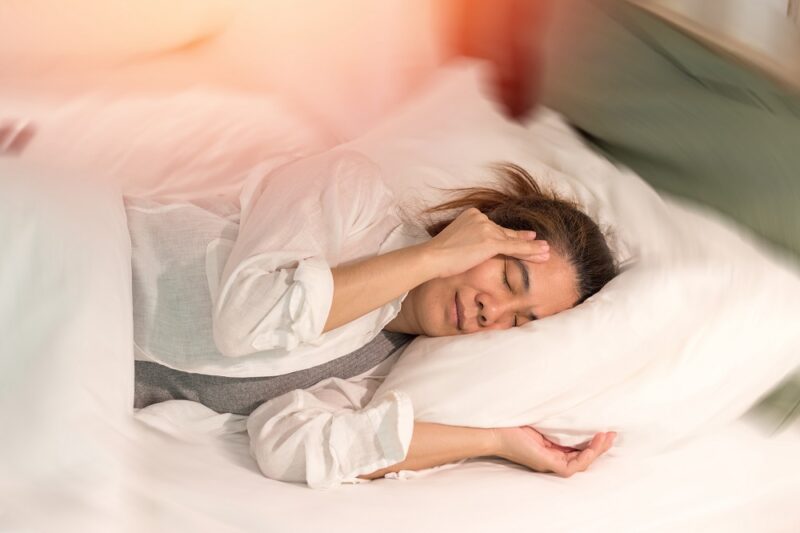
Read the most important causes of sudden dizziness when lying down and standing up in this article from Alamo.
Causes of sudden dizziness when lying down and standing up
Vertigo can be a temporary or chronic condition that can cause serious problems for sufferers. This condition can have various causes that must be identified for treatment. In this article from Alamo, we present the cause of sudden dizziness when lying down and standing up + home treatment.
Also read: The reason for the sudden drop of water from the vagina
Causes of dizziness when lying down
Dizziness when lying down can be caused by various factors. Some common causes include:
1. Dizziness when lying down due to low blood pressure
Orthostatic hypotension, or a sudden drop in blood pressure when you change position, such as lying down or standing up very quickly, can cause temporary dizziness.
2. Benign paroxysmal vertigo (BPPV)
This condition occurs when the tiny crystals in the inner ear become dislodged and move to the wrong area, causing vertigo when the head changes position, such as lying down.
3. Dizziness when lying down due to inner ear problems
An infection or inflammation of the inner ear, such as labyrinthitis or vestibular neuritis, can cause dizziness when lying down.
4. Vertigo while lying down due to Meniere’s disease
It is an inner ear disorder characterized by episodes of vertigo, hearing loss, and tinnitus.
5. Sudden dizziness while lying down due to migraine
Some people with migraines experience dizziness or lightheadedness as a symptom, which may worsen when lying down.
6. Dizziness due to dehydration
Not drinking enough fluids can cause dizziness or light-headedness, especially when changing positions.
7. Sudden dizziness due to stress and anxiety
Psychological factors such as stress and anxiety can cause dizziness or a feeling of imbalance.
8. Cardiovascular problems cause sudden dizziness
Conditions that affect the heart or blood vessels, such as arrhythmia or atherosclerosis, can cause dizziness when lying down.
If you experience persistent dizziness while lying down, it is imperative that you consult a healthcare professional for proper diagnosis and treatment. They can assess your symptoms and recommend appropriate management or interventions to address the underlying cause.
Also read: What is the cause of sudden right and left ear tipping?
Cause of sudden dizziness when standing up
Sudden dizziness when standing up is known as orthostatic hypotension or postural hypotension. It happens when blood pressure drops while standing, causing a temporary reduction in blood flow to the brain. Common causes of orthostatic hypotension include:
1. Sudden dizziness when standing up due to dehydration
Inadequate fluid intake can reduce blood volume and cause orthostatic hypotension.
2. Sudden dizziness when getting up due to drugs
Some medications such as diuretics, alpha blockers and some antidepressants can cause orthostatic hypotension as a side effect.
3. Dizziness when getting up due to age
As we age, our bodies may have trouble maintaining blood pressure and adapting to sudden changes in body position, leading to orthostatic hypotension.
4. Dizziness due to diseases
Certain diseases such as Parkinson’s disease, diabetes and adrenal insufficiency can cause orthostatic hypotension.
5. Dizziness when getting up due to pregnancy
Orthostatic hypotension can occur during pregnancy due to hormonal changes, increased blood volume and pressure on blood vessels.
6. Exposure to heat
Prolonged exposure to hot environments or heavy sports can cause dehydration and orthostatic hypotension.
7. Deficiency of some vitamins
The lack of some vitamins in the body can cause dizziness when standing. Vitamin B12 can be mentioned among the most important of these vitamins.
Also read: Triamcinolone ointment for vagina


Causes of dizziness when sleeping on the side
Feeling dizzy while sleeping on your side can be related to a condition called benign paroxysmal vertigo (BPPV). BPPV occurs when calcium carbonate crystals called otocenia dislodge from their normal location in the inner ear and enter the semicircular canals, which They are responsible for maintaining balance.
When you sleep on your side, the crystals can shift and move, causing you to feel dizzy or dizzy. This is because the brain receives conflicting signals about the position of your body, which leads to dizziness. BPPV is usually a temporary condition and can be treated with special head and body movements known as the Epley maneuver, which help reposition the crystals in the inner ear.
For an accurate diagnosis, it is important to consult a specialist, as other conditions can also cause dizziness when lying down. They can recommend appropriate treatment options and provide guidance on how to effectively manage symptoms.
The cause of dizziness when closing the eyes
There can be several reasons why you feel dizzy when you close your eyes. Here are some possible reasons:
1. Benign paroxysmal vertigo (BPPV)
As mentioned earlier, BPPV can cause dizziness when changing the position of the head even with the eyes closed.
2. Dizziness when closing the eyes due to anxiety
Feelings of anxiety or stress can sometimes make you feel dizzy or unbalanced, even with your eyes closed.
3. Diseases and problems of the inner ear
An infection or inflammation in the inner ear can cause dizziness even with the eyes closed because it affects the balance system. including diseases such as vestibular neuritis, Meniere’s (endolymphatic hydrops),
4. Incompatibility of vision and vestibule
Closing your eyes while your body is moving, such as a moving vehicle, can cause dizziness or motion sickness.
5. Dizziness when closing the eyes due to migraine
Some people with migraines may experience dizziness or lightheadedness even with their eyes closed.
Consultation with a health care professional is essential to determine the specific cause of vertigo, as they can perform a physical examination and order diagnostic tests to rule out any underlying disease. Based on the findings, they can recommend appropriate treatment options to manage your symptoms and improve your overall health.
Also read: What is the cause of leg cramps in sleep due to vitamin deficiency?


Home remedies for dizziness when lying down and standing up
Unfortunately, there are no home remedies for vertigo when lying down and standing up, as it is often due to underlying medical conditions. However, here are some tips that may help manage symptoms:
1. Get up slowly
Take time to stand and move slowly so that your blood pressure gradually adjusts.
2. Avoid changing the situation suddenly
Avoid sudden movements that can cause sudden changes in blood pressure, such as standing up too quickly or lying down suddenly.
3. Stay hydrated
Drinking enough fluids can help prevent dehydration, which can contribute to dizziness.
4. Do regular exercise
Engaging in physical activity, such as walking or stretching, can improve blood flow and help reduce dizziness.
5. Home treatment of dizziness with ginger
Ginger is known for its anti-inflammatory properties and can help reduce dizziness caused by motion sickness or nausea. You can try drinking ginger tea or consuming fresh ginger slices.
6. Inhale peppermint oil
The scent of peppermint oil can help reduce dizziness caused by nausea or headaches. You can try inhaling the oil or applying it to your temples.
7. Have enough rest
Dizziness can worsen with fatigue, so getting enough sleep and rest during the day can help reduce symptoms.
8. Meditate for the home treatment of vertigo
Practicing deep breathing and relaxation techniques can help reduce anxiety or dizziness caused by stress.
Note that these treatments are not a substitute for medical advice and it is essential to seek professional advice if symptoms persist or worsen.
Also read: Doxycycline capsules for vaginal infection
last word
We hope that this article from Alamo titled the cause of sudden dizziness when lying down and standing up and its home remedies was useful for you.
RCO NEWS
RCO
















